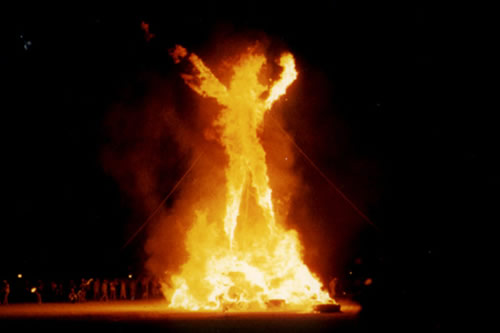Regrettably I’ve never made it to the Burning Man festival, but I’ve been fascinated by the reports I’ve read. The Huffington Post carries a report that shows the spiritual side of the event, and the pagan commonalities with Shinto are evident in the purifying nature of fire, the written expression of hopes and anxieties (a kind of purgation), and the perishable form of the shrine-temple (reminiscent of early Shinto when worship was performed outdoors in temporary structures of natural materials). Here in this quintessential New Age spirituality is the kind of yearning which inspired the primal religions of early times.
What is Burning Man? A festival at the end of August when according to the official site, “tens of thousands of participants gather in Nevada’s Black Rock Desert to create Black Rock City, dedicated to community, art, self-expression, and self-reliance. They depart one week later, having left no trace whatsoever.”
*******************************************************
For a five-minute video of the Burning Man temple, please click here: http://www.huffingtonpost.com/2014/01/07/burning-man-temple_n_4557879.html
*******************************************************
The Huffington Post | By Lydia O’Connor Posted: 01/07/20
Outsiders to the Burning Man community may only know the arts festival as a giant party in the Nevada desert, but a newly released short film from last year’s event celebrates one of the things that makes the gathering so much more than that: the Temple.
Released Tuesday by Already Alive — the studio founded by the film’s director, composer and cinematographer, Michael Marantz — “The Temple” is an homage to the sacred structure that attendees fill with photos, messages, trinkets and thoughts as a symbol of closure. At the end of the week, the Temple is burned to the ground.
“Now that many in our society have moved beyond traditional religion, how do we move past tragedy? How do we mark the exciting events in our lives and how do we deal with life’s inevitable trials?” the filmmakers ask. “Some people who face these questions find the answer in the most unlikely of places, Burning Man.”

Real-life Burning Man (courtesy Wikicommons), eerily reminiscent of the 1973 Wicker Man film (ironically written as an anti-pagan story which however became a cult classic)

ironically written as an anti-pagan story
That’s always been my view of it; I’ve never really understood the mass appeal it has in the pagan community…
Hi Eric…
I guess the appeal would be that it depicts a self-encolosed community run along pagan lines, something of a dream for the few isolated pagans of the 1960s and 1970s.
It’s one of several examples of a writer’s intentions turning out to have the opposite effect. Anthony Burgess never meant the violent gang-members of Clockwork Orange to have such appeal, and James Frazer intended to show the backward nature of pagan thought in The Golden Bough but ended up inspiring a generation of free-thinkers.